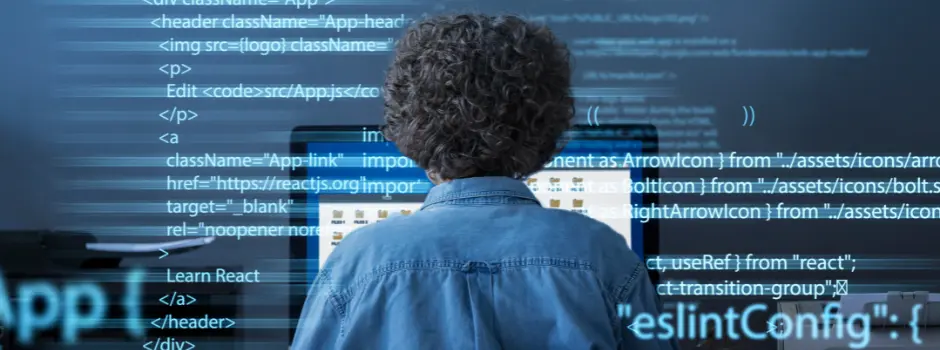![10 Innovative Rust Project Ideas [With Source Code] 1 Post thumbnail](https://www.guvi.in/blog/wp-content/uploads/2024/10/Rust_Project_Ideas.png)
10 Innovative Rust Project Ideas [With Source Code]
Nov 13, 2024 4 Min Read 1019 Views
(Last Updated)
If you are learning Rust and want to upskill yourself and now wondering how you can apply your skills to practical projects? If so, you’re in the right place!
In this guide, you’ll go through some exciting Rust project ideas that not only challenge your problem-solving abilities but also help you master the language step-by-step.
Whether you’re just getting started with Rust or you’re looking to build something more advanced, these Rust project ideas will keep you engaged and on track to become a Rust pro! So, let us get started!
Table of contents
- Top 10 Rust Project Ideas
- Command-Line To-Do List App
- Rust Web Scraper
- Simple Chat Application
- File Encryption Tool
- URL Shortener Service
- Basic Web Server
- Blockchain in Rust
- Rust-Based Game Engine
- Static Site Generator
- REST API with Rust
- Conclusion
- FAQs
- What are the easy Rust project ideas for beginners?
- Why are Rust projects important for beginners?
- What skills can beginners learn from Rust projects?
- Which Rust project is recommended for someone with no prior programming experience?
- How long does it typically take to complete a beginner-level Rust project?
Top 10 Rust Project Ideas
![10 Innovative Rust Project Ideas [With Source Code] 2 Rust Project Ideas](https://www.guvi.in/blog/wp-content/uploads/2024/11/Top-10-Rust-Project-Ideas-1200x630.webp)
Let us see some of the best Rust project ideas to get you started and enhance your coding and performance game!
1. Command-Line To-Do List App
![10 Innovative Rust Project Ideas [With Source Code] 3 Command-Line To-Do List App](https://www.guvi.in/blog/wp-content/uploads/2024/11/Command-Line-To-Do-List-App-1200x630.webp)
The Command-Line To-Do List App is an excellent starting project for beginners who want to explore the basics of Rust programming.
This app allows users to create, delete, and manage tasks directly from the command line, making it a lightweight and useful project.
Time Taken: 1 week
Project Complexity: Beginner
Technology Stack: Rust CLI libraries (clap, serde for serialization)
Learning Outcome: You’ll learn how to work with Rust’s data structures (like structs and enums) and handle user inputs via CLI. You’ll also practice error handling and basic file operations.
Integration with APIs: None
Deployment Options: Locally deployable via command line
Security Measures: Basic input validation to prevent incorrect task entries
Source Code: Command-Line To-Do List App
2. Rust Web Scraper
![10 Innovative Rust Project Ideas [With Source Code] 4 Rust Web Scraper](https://www.guvi.in/blog/wp-content/uploads/2024/11/Rust-Web-Scraper-1200x630.webp)
A web scraper extracts data from web pages, making it a highly versatile and practical project. In this project, you will create a Rust program that sends HTTP requests, parses the HTML, and stores the scraped data.
It’s a great project for understanding how Rust handles asynchronous tasks and concurrency.
Time Taken: 2 weeks
Project Complexity: Intermediate
Technology Stack: reqwest, scraper, and tokio for asynchronous tasks
Learning Outcome: You’ll learn how to send HTTP requests, work with asynchronous code, and parse HTML in Rust. The project helps build a foundation for handling real-time data scraping.
Integration with APIs: Optional (e.g., integrating with JSON APIs)
Deployment Options: Cloud-based or local usage
Security Measures: Rate limiting to avoid overloading servers, proper handling of errors
Source Code: Rust Web Scraper
3. Simple Chat Application
![10 Innovative Rust Project Ideas [With Source Code] 5 Simple Chat Application](https://www.guvi.in/blog/wp-content/uploads/2024/11/Simple-Chat-Application-1200x630.webp)
Building a real-time chat application is an excellent project for exploring Rust’s concurrency and networking capabilities.
This chat app will allow users to send and receive messages over the network, teaching you how to manage WebSockets and handle multiple users simultaneously.
Time Taken: 2-3 weeks
Project Complexity: Intermediate
Technology Stack: tokio for asynchronous networking, tungstenite for WebSockets, and serde for message serialization
Learning Outcome: You’ll dive into network programming, understanding how to handle WebSockets, message passing, and concurrent tasks. It’s a great way to get familiar with Rust’s asynchronous programming model.
Integration with APIs: Optional (e.g., integrating with external chat services)
Deployment Options: Host on a local or cloud server
Security Measures: Encrypt communication using TLS, secure WebSocket handling
Source Code: Simple Chat Application
4. File Encryption Tool
![10 Innovative Rust Project Ideas [With Source Code] 6 File Encryption Tool](https://www.guvi.in/blog/wp-content/uploads/2024/11/File-Encryption-Tool-1200x630.webp)
This project involves building a tool that encrypts and decrypts files, allowing users to secure sensitive data.
You’ll gain experience working with Rust’s libraries for encryption, as well as file I/O operations. This is a fantastic project if you’re interested in cryptography.
Time Taken: 1-2 weeks
Project Complexity: Intermediate
Technology Stack: aes, rand, sha2
Learning Outcome: You’ll learn about encryption algorithms (like AES), randomness generation, and working with files in Rust. This project teaches both cryptography and file management.
Integration with APIs: None
Deployment Options: Local deployment for personal use
Security Measures: AES encryption, secure key generation, hash validation (SHA-256)
Source Code: File Encryption Tool
5. URL Shortener Service
![10 Innovative Rust Project Ideas [With Source Code] 7 URL Shortener Service](https://www.guvi.in/blog/wp-content/uploads/2024/11/URL-Shortener-Service-1200x630.webp)
The URL Shortener Service is a web application that takes a long URL and converts it into a shortened version.
This project involves setting up a basic backend to handle the logic and the database to store URL mappings, offering a full-stack development experience in Rust.
Time Taken: 3-4 weeks
Project Complexity: Advanced
Technology Stack: warp for web framework, sqlx for database interactions, serde for data serialization
Learning Outcome: You’ll learn how to build full-stack applications, manage routing, and store data in a database. This project gives you a deeper understanding of backend development using Rust.
Integration with APIs: Optional (e.g., for analytics or URL tracking)
Deployment Options: Cloud hosting services like AWS, Heroku, or DigitalOcean.
Security Measures: Input validation, secure database handling, HTTPS implementation
Source Code: URL Shortener Service
6. Basic Web Server
![10 Innovative Rust Project Ideas [With Source Code] 8 Basic Web Server](https://www.guvi.in/blog/wp-content/uploads/2024/11/Basic-Web-Server-1200x630.webp)
Building a basic web server is an ideal project for beginners who want to explore web development in Rust.
The project involves handling HTTP requests and serving simple web pages. It’s perfect for understanding how web servers work and how to handle routing.
Time Taken: 1-2 weeks
Project Complexity: Beginner
Technology Stack: actix-web for the web framework, serde for serialization
Learning Outcome: You’ll learn how to build a simple web server, manage HTTP requests, and serve content to users. It’s a fundamental project for web development.
Integration with APIs: None
Deployment Options: Local server or cloud deployment (AWS, Heroku)
Security Measures: Basic security headers and input validation
Source Code: Basic Web Server
7. Blockchain in Rust
![10 Innovative Rust Project Ideas [With Source Code] 9 Blockchain in Rust](https://www.guvi.in/blog/wp-content/uploads/2024/11/Blockchain-in-Rust-1200x630.webp)
This project takes you through the process of building a simple blockchain in Rust. You’ll implement block creation, hashing, and chain validation, giving you a deep dive into blockchain technology.
Time Taken: 4-6 weeks
Project Complexity: Advanced
Technology Stack: sha2 for hashing, rand for randomness
Learning Outcome: You’ll learn the core mechanics of blockchain, how blocks are validated, and how cryptographic hashing works.
Integration with APIs: Optional (e.g., to integrate with cryptocurrency APIs)
Deployment Options: Local or cloud-based blockchain simulation
Security Measures: Use of secure hashing algorithms, input validation, and cryptographic key management
Source Code: Blockchain in Rust
8. Rust-Based Game Engine
![10 Innovative Rust Project Ideas [With Source Code] 10 Rust-Based Game Engine](https://www.guvi.in/blog/wp-content/uploads/2024/11/Rust-Based-Game-Engine-1200x630.webp)
For game developers, building a basic game engine is an exciting and challenging project. This project allows you to create a simple 2D game engine using Rust’s graphics libraries, which can be used to develop cross-platform games.
Time Taken: 8-10 weeks
Project Complexity: Advanced
Technology Stack: ggez for the game engine, rodio for sound
Learning Outcome: You’ll learn how to manage game loops, handle inputs, and render graphics. This project is ideal for understanding the internals of game development.
Integration with APIs: Optional (e.g., multiplayer functionality with WebSockets)
Deployment Options: Cross-platform (Windows, Linux)
Security Measures: Input validation, safe memory handling
Source Code: Rust-Based Game Engine
9. Static Site Generator
![10 Innovative Rust Project Ideas [With Source Code] 11 Static Site Generator](https://www.guvi.in/blog/wp-content/uploads/2024/11/Static-Site-Generator-1200x630.webp)
This project involves building a static site generator that converts markdown files into HTML pages. It’s a great project to explore file I/O and templating in Rust, as well as learn how to automate web content generation.
Time Taken: 2-3 weeks
Project Complexity: Intermediate
Technology Stack: markdown for parsing, askama for templating, std::fs for file operations
Learning Outcome: You’ll learn how to parse files, generate HTML templates, and automate the process of creating static websites.
Integration with APIs: None
Deployment Options: Can be deployed to static hosting platforms like GitHub Pages or Netlify
Security Measures: Sanitize file inputs to prevent directory traversal vulnerabilities
Source Code: Static Site Generator
10. REST API with Rust
![10 Innovative Rust Project Ideas [With Source Code] 12 REST API with Rust](https://www.guvi.in/blog/wp-content/uploads/2024/11/REST-API-with-Rust-1200x630.webp)
In this project, you’ll build a fully functional REST API, handling CRUD operations. It’s perfect for learning how to manage routes, handle data, and build scalable web applications with Rust.
Time Taken: 3-4 weeks
Project Complexity: Advanced
Technology Stack: warp for web framework, tokio for asynchronous tasks, serde for serialization
Learning Outcome: You’ll learn how to build and manage RESTful services, handle routing, and ensure that the API interacts correctly with a database.
Integration with APIs: Optional (e.g., integration with third-party services like payment gateways)
Deployment Options: Cloud deployment on AWS, DigitalOcean, or Heroku
Security Measures: Secure user authentication and data encryption (e.g., JWT, HTTPS)
Source Code: REST API with Rust
These Rust project ideas should give you further insights into the exciting possibilities Rust offers, along with practical projects to enhance your skills!
Conclusion
In conclusion, starting your Rust journey with practical projects is the fastest way to learn and grow as a developer. Each project offers a unique learning experience, challenging you to apply your knowledge and improve your skills.
Whether you’re a beginner or aiming for more complex tasks, Rust’s robust ecosystem has something for everyone.
FAQs
1. What are the easy Rust project ideas for beginners?
If you’re a beginner, start with simpler projects like the Command-Line To-Do List App or a Basic Web Server. These will give you hands-on experience with Rust’s core features without overwhelming you.
2. Why are Rust projects important for beginners?
Rust projects allow beginners to apply theoretical knowledge in practical scenarios, helping them better understand the language’s unique features like memory safety and concurrency.
3. What skills can beginners learn from Rust projects?
You’ll gain valuable skills in managing memory, working with concurrency, understanding Rust’s ownership model, and handling real-world challenges like error management and performance optimization.
4. Which Rust project is recommended for someone with no prior programming experience?
For complete beginners, the Command-Line To-Do List App is a great project. It’s simple and focuses on core Rust concepts like structs, enums, and I/O handling.
5. How long does it typically take to complete a beginner-level Rust project?
A beginner project like the Command-Line To-Do List App or Basic Web Server can take anywhere from one to two weeks to complete, depending on your pace and familiarity with Rust.

























![10 Incredible PyTorch Project Ideas [With Source Code] 15 PyTorch Project Ideas](https://www.guvi.in/blog/wp-content/uploads/2024/11/Feature-image.png)
![10 Unique Deep Learning Project Ideas [With Source Code] 16 Deep Learning Project Ideas](https://www.guvi.in/blog/wp-content/uploads/2024/10/DeepLearning_Project_Ideas.png)
![10 Impressive Data Visualization Project Ideas [With Source Code] 17 Data Visualization Project Ideas](https://www.guvi.in/blog/wp-content/uploads/2024/11/best_data_visualization_project_ideas_with_source_code_.webp)
![Top 10 Ruby on Rails Project Ideas [With Source Code] 18 Ruby on Rails Project Ideas](https://www.guvi.in/blog/wp-content/uploads/2024/10/Ruby_on_Rails_Project_Ideas.png)
![10 Unique Keras Project Ideas [With Source Code] 19 Keras Project Ideas](https://www.guvi.in/blog/wp-content/uploads/2024/10/Feature-Image.png)
![10 Outstanding TensorFlow Project Ideas [With Source Code] 20 TensorFlow Project Ideas](https://www.guvi.in/blog/wp-content/uploads/2024/10/Top-10-Tensorflow-Project-Ideas-Feature-Image.webp)
![Top 13 Tableau Projects [with Source Code] 21 tableau projects](https://www.guvi.in/blog/wp-content/uploads/2024/11/tableau-projects.webp)
Did you enjoy this article?